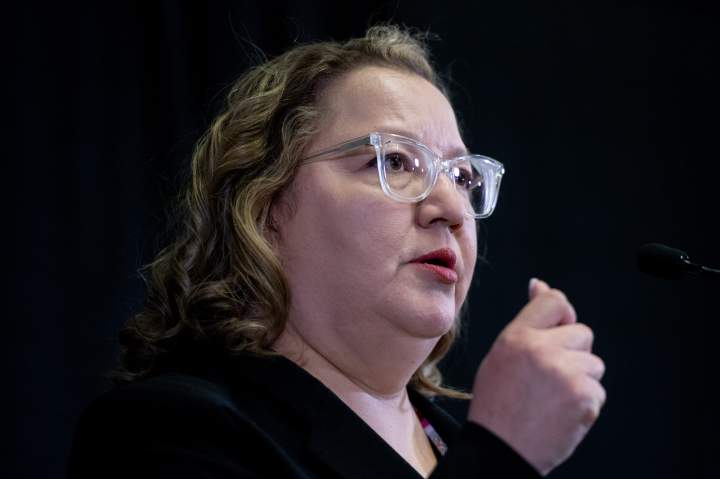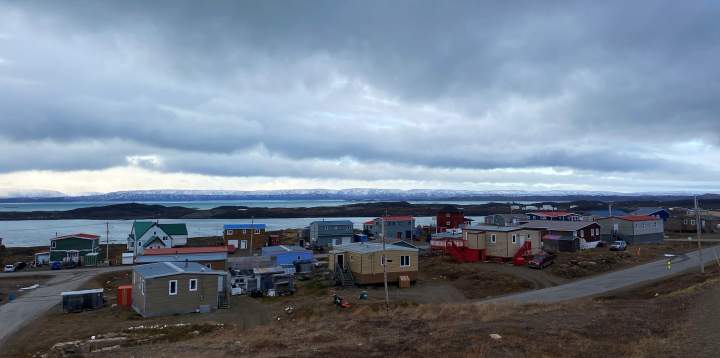By
Andrew Russell ,
Carolyn Jarvis & Michael Wrobel
Global News
Published November 23, 2022
12 min read

Dwayne Ferguson arrived in Canada at the age of six as Hurricane Ivan devastated his home country of Grenada in 2004.
But the chaos in his life only deepened.
By the age of nine, he was placed into the care of Ontario’s child-welfare system after experiencing trouble at home.
Ferguson spent the next six and a half years bouncing around 10 different placements in foster and group homes before finally landing in the care of Hatts Off – a for-profit company that is the second-largest operator of kids’ group homes in the province.
His former teacher remembered him as a gentle and curious young man. He didn’t like the bologna sandwiches that Hatts Off sent him to school with, she said, but they kept giving them to him anyway.
“Eventually, he just started throwing them in the garbage each day because they either didn’t listen or didn’t have anything else to give him,” she said.
At Christmas, the teacher said she bought Ferguson and his friend – who also lived at Hatts Off – winter jackets, as she knew the kids would receive little over the holidays.
“They were so proud of those jackets and took excellent care of them,” the teacher said.
But more than anything, he dreamed of being reunited with his mother and brothers.
“Dwayne was hopeful that they would be able to live together as a family once again,” said his former teacher, whom Global News isn’t identifying because she isn’t authorized to speak publicly about Ferguson.
“[He] just endured heartbreak after heartbreak.”
Ferguson died by suicide in 2014. He was 16.
He was found near a pathway behind the Hatts Off group home where he lived in Hamilton, Ont.
In the years that followed Ferguson’s death, a trail of documents, including a secret draft report and an expert panel review for the Ontario coroner, countless inspections, and multiple whistleblowers from inside the company pointed to signs of concern at Hatts Off.
It’s the latest finding from an ongoing Global News investigation into Ontario’s child-welfare system, which has revealed allegations by workers and youth of widespread neglect at some group homes operated by for-profit companies. It also uncovered minimal accountability or government oversight.
“Nobody wants to pull the lid off of that and look at it because then lots of people would be held accountable,” said Grant Charles, an associate professor at the University of British Columbia’s School of Social Work.
“There are a lot of people that are part of this, being complicit.”
Global News has learned that concerns about Hatts Off were chronicled in the 2018 report “Safe With Intervention,” which led to calls for change in child welfare.
The review was prepared for the Ontario coroner and funded by the province. It examined the tragic stories of Dwayne Ferguson and 11 other kids who died in the care of the child-welfare system – the majority of whom were Indigenous or Black.
The authors – which include Canada’s leading experts on child welfare – found that Hatts Off had not supplied Ferguson with the “therapeutic intervention” and “structured and supportive living environment” that assessments of his needs had called for.
His children’s aid society had requested the group home connect him with “community-based mental health services.” That did not occur, the examination of Ferguson’s death found. He had been diagnosed with complex post-traumatic stress disorder, multiple mental health issues and a learning disability.
The report didn’t identify Ferguson by name, instead telling the story of “Danny,” who arrived in Canada at age six. Details from Danny’s history parallelled Dwayne Ferguson’s, and by talking to Dwayne’s former teacher and Hatts Off workers, Global News was able to verify that Danny was, in fact, Dwayne.
But those weren’t the only alarm bells sounding about the quality of care inside Hatts Off group homes. Around the same time, another government body tasked with protecting kids was also looking into the company’s operations.
In 2018, staff with the Office of the Provincial Advocate for Children and Youth (OPACY) deemed the group home provider a “hot spot” of concern based on the information it had received.
Child and youth advocates interviewed 26 kids to get a better understanding of life inside Hatts Off.
Global News obtained a copy of the draft report they produced, with the working title “You Don’t Have To Live Here!”, along with additional materials and notes from the child advocate’s staff. The report also examined two other group-home operators in western Ontario.
Children described the Hatts Off group homes as chaotic living environments, according to the documents.
A dozen kids who were interviewed described frequent use of violent physical restraints, cruel punishments by staff – like isolation in their rooms for long periods – and little money for outings or food.
“One staff put hands on me … when I was trying to help, and she threatened to squeeze my neck,” one youth told staff with the advocate’s office.
Nearly half of the kids interviewed also spoke about police being called to the homes.
“Police scare me due to my past, and it rehashes some of my trauma,” said one child.
Other kids offered remarks like, “Not a lot of food left in the house” and “they say they don’t have money for outings.”
Another kid said that if residents were late for school or missed the bus, staff would send them to their room for 45 minutes and then let them out for 15 minutes in a cycle that was repeated for 24 hours, according to documents from the advocate’s office. The punishment, kids said, was called “Away From Group.”
These findings underscore revelations from a Global News investigation that included interviews with 70 current or former Hatts Off staff members and youth. More than two dozen interviewees raised concerns about a lack of on-the-job training or the hiring of workers who didn’t have backgrounds in caring for kids with complex needs.
One former worker said, “Isolation was a huge consequence,” where kids were sent to their rooms for hours.
“They made it sound nice by saying ‘go take space,'” said one former worker. “But it was mean.”
The company declined repeated interview requests.
Hatts Off’s chief operating officer, Bronwyn Naylor, said in a statement that the use of lengthy “isolation” was unacceptable and physical restraints are only used as a last resort when a child is an immediate risk to themselves or others.
“We do not have a practice known as ‘away from group,’” Naylor said, which allegedly kept kids isolated in their rooms for long periods of time. “If an individual is having difficulty in a group setting, the staff may ask them to take a break and compose themselves until they wish to return.”
The company said short periods of isolation can be an appropriate “de-escalation strategy to ensure everyone remains calm and safe.”
All staff take “intensive training and continued education,” Naylor added. The company agreed to participate in the OPACY report to “promote the voices of children and youth.”
Following the OPACY examination, it appointed three people to “review and monitor serious occurrences” within Hatts Off.
“In addition, a council of youth was also appointed to amplify voices of the children and youth in our organization,” Naylor said. She also said the company held workshops on “caregiver fatigue, enhancing programming, and understanding trauma.”
In response to the allegations involving Dwayne Ferguson from the expert panel commissioned by the province, Hatts Off said that due to confidentiality reasons, the company would be “unable to comment” on any specific individual or cases.
The company said its budgets “provide separate allowances for food, travel, and clothing, each of which are equal to or exceed what an average Canadian household of comparable size would spend.”
The draft report from the provincial advocate that contained serious allegations about Hatts Off never saw the light of day.
It was meant to be released publicly. There were meetings about its contents with the province and the company, according to former staff with the child advocate’s office.
But in 2019, the Ford government closed the Office of the Provincial Advocate for Children and Youth as part of a cost-saving measure, and the report was never published.
Some of the office’s powers were shifted to the Ontario Ombudsman, which also investigates complaints in jails, health care and education, among other sectors.
Elman said his office handed over 16 incomplete investigations involving the mistreatment of youth to the Ombudsman.
A spokesperson for the Ombudsman said some of OPACY’s investigations have been resolved, but none of their findings have been made public. Work continues on others.
Although the Hatts Off report was never formally transferred, former OPACY staff said current workers and managers at the Ombudsman were aware the review of Hatts Off had been produced.
“We do not comment on whether or not we have received specific complaints, or discuss cases in progress,” Ombudsman communications director Linda Williamson said in an email, adding that “no final versions” of the report had been handed over.
It wasn’t just multiple reports that highlighted allegations of bleak living conditions inside Hatts Off.
Several former workers also sounded the alarm.
One described bringing complaints about the quality of care to her Hatts Off supervisors, children’s aid societies, the Ombudsman, ministry and police. Others said they made similar calls.
Yet no one listened, the former worker said.
“The Ministry acknowledged that they had received numerous reports of concerns from Hatts Off staff,” said one former worker, whom Global News is not identifying as they currently work with vulnerable kids. “I never heard back from the Ombudsman, and I never saw them formally address any of the concerns.
Global News reached out to five different children’s aid societies, police agencies, the Ombudsman, and the province. The agencies and police provided little response or sidestepped questions entirely about the concerns workers raised.
When Global News reporters visited the Hatts Off CEO’s home looking for answers, the police were called and warned them to stay off the property.
The lack of response to the allegations inside Hatts Off left kids feeling hopeless, the former worker said.
Jamar Morrison spent several years in the care of Hatts Off from the time he was 12 and said it felt as if there was no oversight or anyone investigating what was happening.
“That’s the issue: the government’s not watching,” he said.
“You’re a number there. You are a child that creates revenue,” he said. “No matter what anyone tries to say, that’s what you are.”
Ministry inspection reports from 2020 and 2021 – obtained by Global News through a freedom of information request – provided more evidence that the province had information pointing to problems at Hatts Off.
At one residence, inspectors said they found dead bugs, dirty dishes and takeout containers piling up in kids’ rooms, and overflowing garbage cans.
An inspection report for another home noted that flooring and walls were damaged, debris was strewn across the lawn, there was “smeared blood” on the drywall in one resident’s room, and areas around the bathtub, faucet and ceiling in a bathroom were “black with mould.”
Hatts Off’s Bronwyn Naylor said the company takes all inspection reports seriously, and they are dealt with in a “timely manner.”
“The items that were found outside had been thrown outside bedroom windows,” she wrote, referring to the debris inspectors identified as littering the property. “Sometimes this happens during the winter months and cannot be addressed immediately because they have been frozen to the roof and ground.”
As part of its ongoing investigation into the child-welfare system, Global News first reached out in May to Merrilee Fullerton, Ontario’s Minister of Children, Community and Social Services, for a sitdown interview.
For months, her office declined, instead offering written statements that dodged most questions.
In late October, her office agreed to a short interview at Queen’s Park: two minutes.
Fullerton said the allegations uncovered by Global News into for-profit homes were “horrific,” and that a redesign of the province’s child-welfare system is underway.
“We’re speaking to children and youth and getting their lived experience, getting their understanding of what happened and helping to rebuild the child-welfare system,” Minister Fullerton said. “We’re putting more inspectors into these homes, unannounced inspections, and responsive inspections.”
“We’re increasing oversight and accountability.”
When the time was up, the minister was ushered away.
The minister spoke about the importance of being accountable. She didn’t answer the question about Hatts Off.
But it’s not just one company allegedly putting profits ahead of caring for kids.
Images have shown the ceilings in other group homes are literally caving in.
A child was found sleeping on a soiled mattress, according to inspections. Many kids have said they aren’t getting proper food or the resources they need.
Workers say they aren’t equipped to face the avalanche of mental health problems. Physical restraints occur on a frighteningly regular basis.
And kids and childcare workers are concerned that some group-home providers continue to be driven by profits rather than caring for kids.
“I don’t want people to talk about it,” said Morrison, who spent years in group homes. “I want people to do something.”
If you or someone you know is in crisis and needs help, resources are available. In case of an emergency, please call 911.
The Canadian Association for Suicide Prevention, Depression Hurts and Kids Help Phone 1-800-668-6868 — all offer ways for getting help if you, or someone you know, is suffering from mental health issues.
For a directory of support services in your area, visit the Canadian Association for Suicide Prevention.
If you are a child in the care of a children’s aid society and are experiencing abuse or mistreatment or need help, you can contact the Ontario Ombudsman’s Children and Youth Unit at 1-800-263-2841.
If you would like to share your experience working or living in the child-welfare system, please reach out to us in the form below.



















Comments
Want to discuss? Please read our Commenting Policy first.